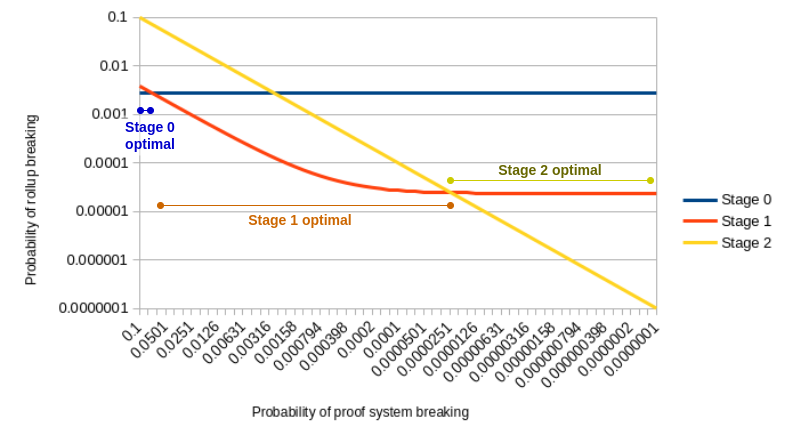Vitalik Buterin Issues Crucial Reminder About Ethereum Rollups
In the rush to fully decentralize rollups, Vitalik Buterin has shared an important reminder that is easy to forget: stage 2 is not always more secure unless the underlying proof system is impenetrable. He clarified in a post, presenting a condensed mathematical model, that moving too quickly to stage 2 without appreciably enhancing proof robustness could actually raise the failure rate.
The model makes the following assumptions: safety and liveness failures are equally likely, and each member of the security council has a 10% independent failure chance. A 4-of-7 multisig is used in stage 0 and a 6-of-8 is used in stage 1. The likelihood that the proof system will break varies. As the proof system's failure probabilities increase, the findings indicate that stage 0 or stage 1 provide more security than stage 2.
Only when the proof system is incredibly dependable (e.g., stage 2 is the best option if the failure rate is 10⁻⁵ or less. Moving to stage 2 with an undeveloped or centralized proof system is the worst possible setup, as Buterin points out, since it combines the risks of both. He also points out how this model does not always apply in the real world, where council members frequently experience common mode failures, collusion vulnerabilities in shared infrastructure or legal coercion, which makes multisig setups less effective in practice than the model suggests.

Even so, a strong proof system is necessary for stage 2 to be safer. Buterin suggests employing proof system multi-sigs, which combine several separate proof systems as a temporary measure to reduce these risks. According to him, stage 2 is not the only thing that matters. In addition to the rollups, decentralization phase ecosystem tools such as l2beat should monitor the maturity of proof system audits. Achieving true security involves a gradual alignment of governance and cryptographic integrity; it is not a checkbox.
免责声明:投资有风险,本文并非投资建议,以上内容不应被视为任何金融产品的购买或出售要约、建议或邀请,作者或其他用户的任何相关讨论、评论或帖子也不应被视为此类内容。本文仅供一般参考,不考虑您的个人投资目标、财务状况或需求。TTM对信息的准确性和完整性不承担任何责任或保证,投资者应自行研究并在投资前寻求专业建议。
热议股票
- 1
- 2
- 3
- 4
- 5
- 6
- 7
- 8
- 9
- 10